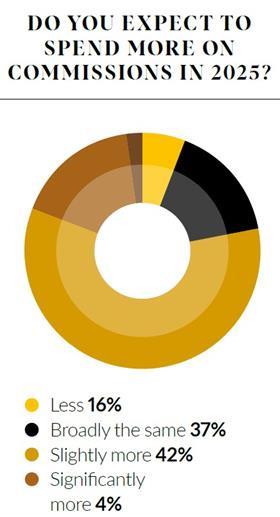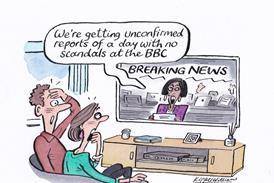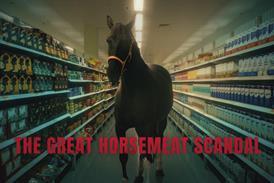Having had to navigate choppy economic waters last year, 2024 has been about achieving stability
If last year’s Commissioner Survey was about crisis management during an industry slowdown, 2024 has been all about steadying the ship and managing expectations.
So has the commissioner who in 2023 implored “I’ve got to hope that next year won’t be as tough as this” got their wish? Not especially.
Our latest poll of 83 commissioners finds that 34% believe market conditions for commissioning are better than last year (26% say slightly better; 8% significantly). But this is balanced by the 40% who think conditions have got worse (30% slightly worse; 10% significantly).
Even one of those who says things are getting significantly better acknowledges they are looking to the long term beyond what they brand the current “shit situation”.
“We’ve been through a period that was overheated and unsustainable, and we’re now seeing the aftermath of that”
They explain: “Without sounding callous, the market is cyclical, as with most other industries. We’ve been through a period that was extremely overheated and unsustainable and we’re now seeing the aftermath of that. The previous 10 years to that had been relatively stable.
“Audience demand is changing, and the number of streamers, broadcasters and indies will continue to consolidate over the next couple of years, which will impact labour demand on all fronts.”

Commissioning in 2024 was a mixed bag. Some 29% of respondents commissioned more hours than in 2023 (up from just 7% in 2023 who had ordered more than in 2022) and, of that 29%, some 12% say hours increased significantly. But equally, 29% say they ordered fewer hours, down from 48% in 2022/23.
In terms of volume of titles, 30% say the number of shows they commissioned is up (compared with 12% last year) while 27% ordered fewer shows and 43% about the same. If there was an expectation that 2024 would show a marked improvement on 2023, it has not been borne out in our survey.
There are variations across broadcasters and genres. PSBs are broadly scaling up productions at the expense of the ‘squeezed middle’, but where lower-tari shows are being commissioned, there is greater volume to fill schedules or VoD libraries, and/or to stockpile series for future TX.
“For lower-tari shows, we’ve started extending the run so there are better economies of scale, and that makes sense for the indies,” one PSB factual commissioner notes.
Another responds: “Sometimes the slowdown has meant a slight pause in production [for returning series] but with the intention that the programmes will continue.”
Strategic rethink
Several of those who are commissioning a similar or lesser volume of both hours and shows say their business strategy has been realigned to cope with the new market conditions.
One commissioner who is ordering fewer shows explains their company’s rationale: “We’ve removed the middle ground, and a lot of that money has gone to fund premium shows as part of our fewer, bigger, better strategy. This eats into commissions and hours.
“The bar is higher to get premium shows over the line, but that’s because the story, and the programme overall, needs to be excellent to draw viewers onto our streaming platform. In a world where there’s a million things to watch, on platforms like YouTube or TikTok, ideas need to be exceptional.”

Meanwhile, just under a third (32%) of respondents have had to abandon a commission in the past year, typically due to production issues such as access problems, or talent or co-producers pulling out (30%). Financial constraint (18%) and legal issues (12%) are also cited as reasons for cancellation.
More than three-quarters of respondents (77%) say the cost of production has risen over the past 12 months, with one in five (19%) saying the increase was “rapid”.
When it comes to managing increases in production costs, some 58% of commissioners have increased their tariffs – and the same volume say they expect indies to seek additional funding. Just one in four (25%) say they will seek additional funding as well.
“Flexible where possible, but compromised wherever we need to” is one commissioner’s summary of a state of a airs recognised by several respondents for whom editorial ambition dictates the budget.
“We have increased tariffs on the tighter budgets and expect companies to deliver to budget on the higher tariffs,” says one commissioner, who has begun looking for other funding opportunities.
Another adds: “For our premium shows, we’ve increased our tariffs, which is the right thing to do. Where the idea has international appeal, we do ask indies to seek additional funding – not necessarily to squeeze the tariff, but we generally want to up the ambition, so additional funding will help.”
Spending optimism
Some acknowledge the pressure all this puts on suppliers. “I’m slightly concerned that what we’re asking for versus the agreed cost with production company execs and directors is a burden that is affecting production teams’ ability to do their jobs in a healthy way, both mentally and creatively,” one commissioner observes.
The good news for producers is that the prospects for 2025 are better. Almost half of commissioners expect to spend more in 2025. Some 42% say they will spend slightly more, and 4% significantly more. Only 16% foresee spending less, and just over a third (37%) predict they’ll stay on an even keel.
That said, more than two-thirds (69%) are “very concerned”, and just over a quarter (26%) “moderately concerned”, about the feast-or-famine nature of the commissioning cycle and its impact on indies and freelancers.
“There is no safety net, and we’re seeing smaller, wholly independent businesses closing,” one commissioner says. “That leaves the super-indies in pole position for commissions, and I’m concerned this will eventually lead to a less creative environment. However, we’re in a period of huge change and losses are inevitable. We need to be more creative about content across the board.”

Seeing established indies and talented people “desperate for work” is “hard for us to witness and even harder for them to endure,” another adds.
As with last year, the plight of freelancers is a particular concern. Some 95% of respondents are worried that more will leave the industry, and 90% agree their organisation has a responsibility to support them.
Several point to the support they o er: fast-track schemes, training, mentoring, sharing CVs, networking opportunities and collaborations with bodies such as ScreenSkills and the Film and TV Charity, though such efforts are still “too little” for some.
“The best thing we can do is continue commissioning series at the same rate and keep budgets in line with market rates,” says one, while another says they are monitoring indies “to keep pipelines going, especially on returning series”.
There are inescapable challenges, however. “We’re constrained by our own budgets, which vary across the year, so it isn’t as straightforward to manage consistency as people think,” one respondent reflects. “However, when you have friends in the industry who are struggling to survive, you really feel for them.”
MORE FROM COMMISSIONER SURVEY 2024
Slowdown puts relations with indies under pressure
Job satisfaction still high in ‘fun, varied and creative’ role
Responses also highlight the negative picture this paints for people considering working in the industry, and the impact of the “brain drain” for those thinking twice about what they need to do to survive.
“There’s increased pressure on everyone who is still working, coupled with no real jobs for others.
That means there’s potential for stagnation, both in terms of career development and ideas themselves,” one writes.
Others offer an even more brutal assessment. “It is preferable for people who can genuinely find work to stay in the industry and for others to seek alternatives if there’s less work available,” says one respondent, while another concludes: “It is terrible that people are out of work, but the industry grew to an unsustainable size and it needs to rebalance.”

One answer could be to consider a more flexible approach to genre. While only a quarter (25%) believe their organisation needs to be more transparent about its genre spending priorities, more than three-quarters (79%) say they would consider commissioning indies in a genre in which they have not worked previously.
Clearly, this would need a steady hand at the tiller, and a suitable mix of skills and experience in the indie’s workforce.
“In the generational shift in viewing behaviour we are going through, some genres will expand and some will contract, so training freelancers to cross genres is crucial,” one commissioner notes.
Another goes further, stating that the freelancer crisis is “the new normal”. They urge: “Being concerned won’t change the situation we find ourselves in. We need to work together with producers, be transparent about the challenges, and find a way through this together. We have to keep moving forward.”
Broadcasters look to steady the ship
- 1
 Currently reading
Currently readingCommissioner Survey: Broadcasters look to steady the ship
- 2
- 3
- 4
- 5



































No comments yet